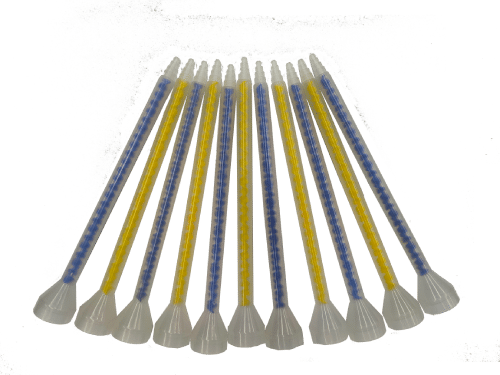Epoxy mixing nozzles play a crucial role in the precise and efficient mixing and dispensing of epoxy-based materials. However, it is important to understand how heat can affect the functionality and performance of these nozzles. In this article, we will explore the key considerations regarding the impact of heat on epoxy mixing nozzles, including viscosity changes, curing time, and nozzle integrity. By understanding these factors, professionals can make informed decisions to ensure optimal results in their epoxy applications.
Viscosity Changes:
Epoxy resins and hardeners are known to exhibit temperature-sensitive behavior, with viscosity being particularly affected. Higher temperatures tend to reduce the viscosity of epoxy, making it flow more easily. As a result, the mixing and dispensing process through the nozzle can be influenced, potentially leading to faster flow rates or even dripping. Professionals must be aware of these viscosity changes and adapt their processes accordingly to maintain desired flow rates and achieve consistent results.
Curing Time:
The curing process of epoxy is also significantly influenced by temperature. Elevated temperatures can accelerate the curing reaction, leading to faster setting and hardening of the epoxy. This can have implications for the working time available for mixing and dispensing through the nozzle, as the epoxy may begin to cure more rapidly once exposed to higher temperatures. It is essential to factor in the anticipated curing time when planning epoxy applications to avoid potential issues related to premature curing.
Nozzle Integrity:
Epoxy mixing nozzles are typically constructed from materials specifically chosen for their ability to withstand the curing process and the chemical properties of epoxy. However, prolonged or excessive exposure to heat can potentially compromise the integrity of the nozzle materials. Deformations, warping, or degradation may occur, which can impact the proper functioning of the nozzle and, consequently, the quality of the epoxy mix. Professionals should carefully consider the compatibility of the chosen nozzle materials with the anticipated temperature range to ensure durability and reliability.
Mitigating the Effects of Heat on Epoxy Mixing Nozzles:
-
Temperature Control:
Adhere to the manufacturer’s guidelines regarding the storage and handling of epoxy materials within the recommended temperature range. This helps maintain the desired viscosity and working time, ensuring optimal mixing and dispensing performance.
-
Nozzle Selection:
Choose epoxy mixing nozzles specifically designed to withstand the anticipated temperature range of the epoxy being used. Different nozzle materials may exhibit varying degrees of resistance to heat, so consult the manufacturer’s recommendations or seek expert advice to select a nozzle suitable for the specific application and temperature conditions.
-
Controlled Environment:
Whenever possible, perform epoxy mixing and dispensing in a controlled environment with regulated temperature conditions. This minimizes the impact of external heat sources and ensures more consistent results.
-
Monitoring and Adjustments:
Regularly monitor the flow rate and dispensing behavior of the epoxy through the nozzle during the application process. If any irregularities or unexpected changes are observed, such as excessive flow or premature curing, it may indicate that heat is affecting the process. Promptly make adjustments or modifications as necessary to maintain optimal performance.
Conclusion:
Heat can significantly impact the functionality and performance of epoxy mixing nozzles, leading to changes in viscosity, curing time, and potentially affecting nozzle integrity. By understanding these effects and implementing appropriate measures to mitigate them, professionals can ensure consistent and reliable mixing and dispensing of epoxy-based materials. Careful temperature control, proper nozzle selection, working in controlled environments, and vigilant monitoring are key to achieving optimal results in epoxy applications.

